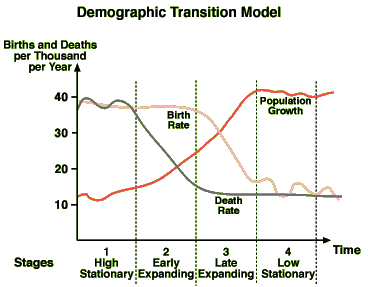 Education level is negatively correlated with the number of births. The effect is seen in both men and women: the more educated you are the fewer children you have. The more memes a country has, the fewer babies people tend to have. The effect is known as the "demographic transition". Japan illustrates this principle taken to an extreme.
Education level is negatively correlated with the number of births. The effect is seen in both men and women: the more educated you are the fewer children you have. The more memes a country has, the fewer babies people tend to have. The effect is known as the "demographic transition". Japan illustrates this principle taken to an extreme.By contrast, in Arfica - where there are fewer memes - birth rates are higher. The Amish, who mostly reject technology, have high fertility, though surrounding areas which embrace culture do not. Few things do as much damage to human fertility as getting a college education.
These observations are broadly consistent with the idea that memes propagate themselves at the expense of host reproductive resources.
The idea that memes drive the demographic transition to promote their own reproductive ends was discussed by Blackmore (1999) - in her section in chapter 11 on "birth control". The idea was treated by Boyd and Richerson in "Not By Genes Alone". I have a section about the hypothesis in my "Memetics" book - where I link the idea to the concept of r/K selection. Also, the idea has been revisted recently by Roman Zakharenko in a work titled: "Fertile or Influential? A Cultural Transmission Theory of Demographic Transition".
Memes prefer to be inside influential individuals. They have various ways of transforming fertile individuls into influential individuals - and they are adapted to use them to facilitate their own propatagion. Influential individuals then broadcast their message to others - often including the memes for being influential individuals. By contrast, fertile individuls have their hands full bringing up babies - and their message doesn't get out.
Memeplexes favour incorporation of "sterility" memes - since they get a doublle fitness boost from them - a boost from linkage with a fit meme, and a boost through making their host more influential.
An interesting paper from Newson et.al (2005) suggests that increased exposure to horizontally-transmitted memes which are deleterious to host DNA is involved. As communication networks expand bewyond the family during the maturation of a society, so exposure to sterilising memes increases.
Blackmore and I have discussed the long-range implications of all this - with Blackmore suggesting that the population will stabilise with a tradeoff between memes and genes, while I have proposed that the memes may succeed in their mass sterilisation program - thus reversing the longstanding trend of an increase in human numbers - and perhaps culminating in a memetic takeover.
References
- Blackmore, Susan, J. (1999) The Meme Machine. Oxford: Oxford University Press
- Richerson, Peter J. and Boyd, Robert (1985) Culture and the evolutionary process. University of Chicago Press.
- Newson, Lesley, Postmes, Tom, Lea, S. E. G. and Webley, Paul (2005) Why Are Modern Families Small? Toward an Evolutionary and Cultural Explanation for the Demographic Transition.
- Newson, Lesley, Postmes, Tom, Lea, S. E. G., Webley, Paul, Richerson, Peter J. and Mcelreath, Richard (2007) Influences on communication about reproduction: the cultural evolution of low fertility.
- Richerson, Peter J. and Boyd, Robert (2005) Not by Genes Alone: How Culture Transformed Human Evolution. University of Chicago Press: Chicago, IL.
- Tyler, Tim (2009) Memetics.
- Zakharenko, Roman (2011) Fertile or Influential? A Cultural Transmission Theory of Demographic Transition.










No comments:
Post a Comment